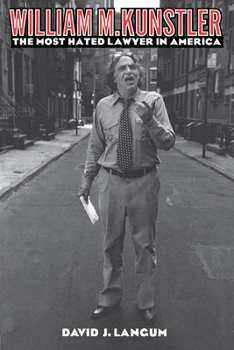William M. Kunstler: The Most Hated Lawyer in America
Select Format
Select Condition 
Book Overview
The true story of the defender of the Chicago 7
Format:Paperback
Language:English
ISBN:0814751512
ISBN13:9780814751510
Release Date:October 2001
Publisher:New York University Press
Length:452 Pages
Weight:1.66 lbs.
Dimensions:1.3" x 6.0" x 9.0"
Customer Reviews
3 ratings
Moonwolf2020.
Published by Thriftbooks.com User , 6 years ago
I Loved this book; one of the comments here by a previous reviewer;about nyc gobbling up both the east and west village is so very true; wmk has been gone from is almost 23 years;i really doubt he would be happy about nyc and it,s law school grabbing up all of lower manhattan displacing many long time tenants and small businesses;david langum ;is a true masterful storyteller;william Kunstler represented my clients of whom most lawyers would run away from and not even touch;he had a true courage and compassion for the people that society considers pariahs and outcasts;a truly inspirational book;i would to also add to the commenter below about the nyu megadorm problem; every city which has large private or to a lesser extent public universities is having the very same problems;it is occurring all over this country;the real problem is the lack of affordable housing for low income students artists and the like.
the book reads like an Oliver Stone film -- including the title
Published by Thriftbooks.com User , 17 years ago
I don't support many of Kunstler's views, outrageous statements and his representation of many of his criminal clients. The courage of civil rights movement lawyers was beyond powerful and Kunstler got involved with the Freedom Rider's case which ignited his fiery passion to be a radical lawyer . Author David J. Langum is a smart story teller because I was entertained when I wasn't being shocked. I had to laugh when he writes about the amount of mail the Chicago 7 received including a letter with some pot which Kunstler and his clients smoked together. Kunstler had unconventional boundaries with clients and Langum has some interesting theories on why. This book did not turn me into a Kunstler admirer but Langum made me think hard about "conveying a message/education to the public" using "movement law". I live in the East Village and we have been mega dormed to death by NYU and even NY Law with a zone busting mega dorm "with balconies" for law students on 3rd St. and my point is these law students seem to care more about their balcony views than what is going down in the communities that are being gobbled up by their Universities. I would like the zone busting part of NY Law dorm removed and everyone of those students to do volunteer work for the evictions and struggles caused by their Universities and other greedy landlords exploiting our neighborhoods. I doubt the NY Law students would do so and those balconies are more enticing but it would be interesting to hear what Kunstler might have said about all this since Langum mentions that he taught at NY Law and William M. Kunstler, I am guessing, also loved our neighborhood with all the texture and characters (although we are losing both every day). I would like to think he would have tried to help. P342 Langum does write, "Kunstler worried especially about the young people, their materalism and lack of social activism." I would add "institutions of higher learning" like NYU and NY Law with their community crushing mega dorms are encouraging anything but students with passion for social activism. I am surprised Oliver Stone hasn't made one of his three hours long films from this book but I wouldn't go see the film; the book was enough and "fair" with lots of grey tones that would not make it into the movie version. There are many ironic notes in this book and for me the most ironic is the back cover which says New York University Press.
Smart Enough to be Funny
Published by Thriftbooks.com User , 24 years ago
Stand-up comedy is not in the index of this book, but it gets mentioned. Along with a list of Kunstler's film credits is a note that when he tried a comedy routine, he got his biggest laugh for a lawyer joke. I was interested, a long time ago, in what Chapter 6 of this book calls Circus in Chicago. Back when I was contemplating what I might like to do in a career in law, I would have enjoyed the opportunity to generate the number of laughs that are contained in this book. Then I actually found a case that said "Resort to the courts is futile." That was such a change from my expectations that an element of humor creeps into my appreciation of the outrageous nature of that truth. As evidence that the author of this book is aware of the potent nature of that form of humor, picture this: "Kunstler objected. The United States attorney jumped up and argued, 'This is outrageous. This man [Kunstler] is the mouthpiece for these defendants. The Government protests this man's attitude.'" (p. 124) I thought that the best legal point in the book was that Bobby Seale could not be retried on the conspiracy charge after the jury found that the other seven defendants were not guilty of conspiracy. Seale hadn't been charged with anything else, so further proceedings in his case would have been pointless. If there is a fine line between legal logic and the quirks of the system, check this book for the side of the line where the quirks are, and maybe you have already seen bits and pieces of this story on TV. It sure made the newpapers when it was going on.






